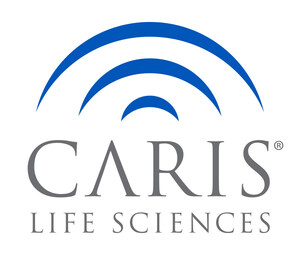Caris Life Sciences Study Shows Molecular Profiling May Expand Use of PD-1 and PD-L1 Inhibitors to Wide Variety of Cancers
Results Published in Cancer Epidemiology, Biomarkers & Prevention Demonstrate Utility of Caris Molecular Intelligence™ in Exploring Expression of Targetable Immune Proteins
IRVING, Texas, Nov. 12, 2014 /PRNewswire/ -- Caris Life Sciences, a biosciences company focused on fulfilling the promise of precision medicine, today announced the publication of a study in which Caris Molecular Intelligence™, the company's panomic, comprehensive tumor profiling service, demonstrated the utility of exploring the expression of two potentially targetable immune checkpoint proteins – the programmed cell death protein 1 (PD-1) and its ligand, PD-L1 – in a substantial proportion of solid tumors. The study results, published in Cancer Epidemiology, Biomarkers & Prevention, a journal of the American Association for Cancer Research, may expand the use of PD-1 and PD-L1 inhibitors, a new class of anticancer drugs, to a wide variety of solid tumors, including some aggressive subtypes that lack targeted treatment regimens.
Caris Molecular Intelligence, the industry's first and largest tumor profiling service, is believed to be the only commercially available service that assays for PD-1 and PD-L1 expression. The newly published study was designed around Caris Molecular Intelligence's multi-technology approach, which included protein analysis (immunohistochemistry [IHC]), gene copy number analysis (in situ hybridization [ISH]), and gene sequencing (next-generation sequencing). The authors analyzed the distribution of PD-1-positive tumor-infiltrating lymphocytes (TILs) and cancer cell expression of PD-L1 in 437 tumor samples (380 carcinomas, 33 sarcomas, 24 melanomas). They reported a wide variation in the presence of PD-1-positive TILs and PD-L1 expression across tumor types.
"The emergence of the PD-1 inhibitor class of anticancer agents is one of the most significant therapeutic advances in the field since the advent of targeted therapy," commented Zoran Gatalica, MD, DSc, executive medical director at Caris Life Sciences, and lead author of the Cancer Epidemiology, Biomarkers & Prevention article. "Our results are especially timely, as they point to inhibition of PD-1 and PD-L1 as a potentially effective strategy in patient populations for whom it has not previously been considered."
PD-1 is an immunosuppressive protein molecule that is upregulated on activated T-cells and other immune cells. It is activated by binding to its ligand, PD-L1, an action that results in intracellular responses that reduce T-cell activation. Reports of aberrant PD-L1 expression in cancer cells have spurred the development of PD-1 and PD-L1 inhibitors. The U.S. Food and Drug Administration (FDA) recently approved an anti-PD-1 therapy, pembrolizumab (Keytruda), for the treatment of advanced or unresectable melanoma. Another anti-PD-1 agent, nivolumab, was recently approved in Japan for the treatment of unresectable melanoma.
Inhibitors of PD-1 and PD-L1 have shown promising results in late-phase clinical trials. In two ongoing studies, progression-free survival curves revealed significant differences between PD-L1-positive and PD-L1-negative patients. Notably, blockade of the PD-1/PD-L1 interaction produced good clinical responses in several, but not all cancer types. Those responses are thought to reflect varying levels of PD-1 and PD-L1 expression in different tumor types.
Study highlights
In their Cancer Epidemiology, Biomarkers & Prevention article, Dr. Gatalica and colleagues noted that PD-1-positive TILs were uncommon in some cancer types (e.g., 0% in extraskeletal myxoid chondrosarcoma, a rare soft tissue sarcoma), but were frequently observed in other types, including triple-negative breast cancer (TNBC, a subtype of breast cancer that lacks estrogen receptors, progesterone receptors, or large amounts of HER2/neu protein; 70%), bladder cancer (73%), microsatellite instability high (MSI-H) colon cancer (77%), non-small cell lung cancer (NSCLC, 75%), endometrial cancer (86%), and ovarian cancer (93%). Expression of PD-1-positive TILs was associated with an increasing number of mutations in tumor cells (p=0.029, Fisher's exact test), whereas PD-L1 expression status showed the opposite association (p=0.004). Cancer cell expression of PD-L1 varied from absent (as in Merkel cell carcinomas, a rare form of skin cancer) to 100% (in chondro- and liposarcomas, rare types of sarcoma that occur in the bones/joints and fat cells in deep soft tissues, respectively).
According to Dr. Gatalica and colleagues, both PD-1 and PD-L1 expression were significantly higher in TNBCs than in non-TNBCs (p<0.001 and p<0.017, respectively). Similarly, MSI-H colon cancers exhibited higher expression of PD-1 and PD-L1 than microsatellite-stable (MSS) colon cancers (p=0.002 and p=0.02, respectively). The researchers also reported that TP53-mutated breast cancers were significantly more positive for PD-1 than breast cancers harboring other oncogenic driver mutations, such as PIK3CA (p=0.002). In NSCLC, co-expression of PD-1 and PD-L1 was identified in eight cases (19%) that lacked any other targetable genetic alterations (e.g., EGFR, ALK, ROS1).
"These latest findings further validate previous studies documenting PD-1 and PD-L1 expression in several common human malignancies, while also yielding new information about expression of these checkpoint proteins in some less common, difficult-to-treat cancers, for which patients tend to have fewer treatment options," said Sandeep K. Reddy, MD, chief medical officer of Caris Life Sciences. "Given that other researchers have reported long-term, durable responses to PD-1 inhibitors in patients with advanced melanoma, kidney cancer, and NSCLC, our results may help further demonstrate which tumor types should be prioritized for future clinical trial investigations."
About Caris Life Sciences and Caris Molecular Intelligence™
Caris Life Sciences is a leading biosciences company focused on fulfilling the promise of precision medicine through quality and innovation. Caris Molecular Intelligence™, the industry's leading tumor profiling service, provides oncologists with the most potentially clinically actionable treatment options available to personalize cancer care today. Using a variety of advanced and validated technologies, which assess relevant biological changes in each patient's tumor, Caris Molecular Intelligence correlates biomarker data generated from a tumor with biomarker-drug associations supported by evidence in the relevant clinical literature. The company is also developing a series of tests based on its proprietary Carisome® TOP™ platform, a revolutionary blood-based testing technology for diagnosis, prognosis, and theranosis of cancer and other complex diseases. Headquartered in Irving, Texas, Caris Life Sciences offers services throughout Europe, the U.S., Australia and other international markets. To learn more, please visit www.carislifesciences.com.
SOURCE Caris Life Sciences
Related Links
http://www.carislifesciences.com
WANT YOUR COMPANY'S NEWS FEATURED ON PRNEWSWIRE.COM?
Newsrooms &
Influencers
Digital Media
Outlets
Journalists
Opted In






Share this article